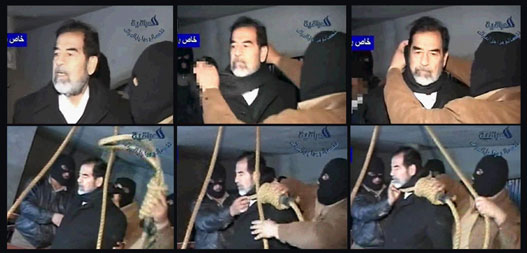Bush chides Iraq over recent executions
(AP)Updated: 2007-01-17 08:29
 A combination photo of frames grabs taken from Al Iraqiya television shows masked executioners preparing to hang former Iraqi president Saddam Hussein in Baghdad December 30, 2006. [Reuters]  |
In his toughest assessment yet, Bush criticized the circumstances of Saddam's hanging last month, as well as Monday's execution of two top aides, including Saddam's half brother.
"I was disappointed and felt like they fumbled the -- particularly the Saddam Hussein execution," the president said in an interview with PBS' Jim Lehrer.
A cell phone video of Saddam's December 30 hanging showed the deposed Iraqi leader being taunted as he stood on the gallows with a noose around his neck. An official video of the execution of Saddam's half brother showed that the hangman's noose decapitated him. Both hangings provoked outrage around the world, but particularly among Saddam's fellow Sunnis in Iraq.
Bush said he had expressed his displeasure about the way Saddam's execution was handled to Iraqi Prime Minister Nouri al-Maliki. The president announced what he called a new strategy for the war last week, with much of it hinging on his trust in al-Maliki's government to make radical changes.
"It basically says to people, `Look, you conducted a trial and gave Saddam justice that he didn't give to others. But then, when it came to execute him, it looked like it was kind of a revenge killing,'" the president said.
"It makes it harder for me to make the case to the American people that this is a government that does want to unify the country and move forward," Bush said. "And it just goes to show that this is a government that has still got some maturation to do."
Bush agreed to the interview, to be telecast Tuesday evening on PBS' "NewsHour With Jim Lehrer," as well as one last weekend on CBS' "60 Minutes" to help sell his revised war plan to the public.
Polls show that Americans are overwhelmingly unhappy with Bush's Iraq policy. Seventy percent oppose sending more troops to Iraq, as he intends to do, according to an Associated Press-Ipsos poll last week
Bush said if a pollster asked for his opinion about Iraq, "I would be one of those that said, 'No, I don't approve of what's taking place in Iraq.'"
He said that keeping his old policies in place in the war would lead to "a slow failure," but withdrawing from Iraq, as some critics suggest, would result in an "expedited failure."
"I am frustrated with the progress," the president said. "A year ago, I felt pretty good about the situation. I felt like we were achieving our objective, which is a country that can govern, sustain, and defend itself. No question, 2006 was a lousy year for Iraq."
Senate Democrats plan by Thursday to introduce a resolution denouncing the president's plan, with floor debate to begin next week -- around the time Bush delivers his State of the Union speech on Jan. 23.
The bill, by not eliminating funding for either current troops or the additions, would be merely an expression of Congress' position. But it would help Democrats gauge Republican support for more aggressive legislative tactics, as well as embarrass Bush.
On Tuesday, Democrats were reaching out to potential Republican cosponsors. Several GOP senators have spoken out against sending more troops.
"The hope is to introduce a bill that would be a bipartisan resolution," said Jim Manley, spokesman for Senate Majority Leader Harry Reid, D-Nev.
House Democrats say they will wait for the Senate to debate the resolution before taking up their own. House Majority Leader Steny Hoyer, D-Md., told reporters Tuesday he anticipates the Senate will have a "significant bipartisan vote" that will help set the tone for the House debate.
White House press secretary Tony Snow suggested that Congress' Democratic leaders think through the ramifications of any vote.
"In an age of instant and global communication, what message does it send to the people who are fighting democracy in Iraq, and also what message does it send to the troops?" he said. "But, you know, the House and Senate are going to do whatever they do. What the president is determined to do is continue moving forward in a way that creates conditions for success in Iraq."
As the president pressed the case for his troop additions, there were ugly reminders from Iraq of the tough job ahead.
More than 100 people died in several attacks on predominantly Shiite areas, including an explosion outside a Baghdad university that killed at least 65 people and a blast at a marketplace for used motorcycles. The United Nations, meanwhile, said more than 34,000 Iraqi civilians died last year in sectarian violence.
|
||
|
||
|
|

